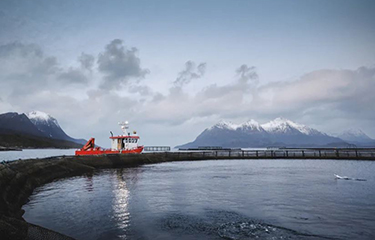Norwegian salmon producers Cermaq and Nordlaks plan to freeze future investments in Norway if the country introduces a proposed 40 percent resource rent tax on salmonid farming.
Cermaq has invested more than NOK 5 billion (USD 460.9 million, EUR 471.8 million) in the two farming regions Nordland and Finnmark since 2016, and according to a press release, the company’s intention was to invest a similar amount in the coming years.
“However, considering the new proposals, we have no choice but to pause, this will naturally impact on growth and job creation in many coastal municipalities in which we operate,” Cermaq CEO Steven Rafferty said.
The company said it will now wait for a clearer understanding of the final proposal and associated regulations.
Cermaq said it does not concur with comments made by Norway’s Finance Minister that salmon producers “did not pay for the old licenses.” It said that its owner – the Mitsubishi Corporation – acquired the company in 2014 at “a market price” from the Norwegian government, which was the principal shareholder.
Cermaq said most of the price paid was for the valuation of the licenses, and that its further growth has been through the license auctions “also at market price,” only two years ago, where the auction price was calculated through the current tax regime.
“On acquisition of foreign-owned companies, it is often appropriate to factor in a country risk within the acquisition price where there is a volatile economy or a politically unstable environment, where Norway is seen as the opposite. It is hard to believe with hindsight that Mitsubishi should have incorporated a country risk for an economy such as Norway,” Rafferty said.
Rafferty said the “vast majority of profits” Cermaq has made in Norway since 2014 have been reinvested in its Norwegian operations, despite the company also having large setups in Canada and Chile.
Also according to Rafferty, there is “little doubt” that the resource tax proposal will lead to less investment in Norway and more outside of the country, which could in turn damage Norway’s position as a leader in aquaculture research and development.
“After many years working in the global salmon industry, I have referred to Norway as a role model for other salmon countries to follow. This cannot be the case going forward if the proposal is mandated,” he said. “There are many details of the proposal that will impact Norway’s competitive position as a frontrunning salmon region negatively. It is a pity that a consultation process could not have taken place prior to the announcement of the new tax.”
Cermaq Norway has four freshwater facilities, 43 sea facilities, and two processing plants. Its salmon production is located in Steigen, Hamarøy, Bodø, Narvik and Øksnes municipalities in Nordland, and Loppa, Alta, Hammerfest and Måsøy municipalities in Finnmark.
“As a major employer in these communities, we want to contribute to growth. We planned a new hatchery in Hasvik municipality in Finnmark, creating 30 new jobs, but that project is now on hold,” Rafferty said.
A similar response to the government’s proposal has been made by family-owned producer Nordlaks. CEO Eirik Welde confirmed that work has now stopped on a new slaughterhouse, filleting factory, and head office at Børøya in Vesterålen, and that its investment in three land-based hatcheries has also been put on hold.
“Together, these four investments amount to NOK 5 billion [USD 460.9 million, EUR 471.8 million] and would create hundreds of new jobs and major ripple effects in the local communities,” Welde said.
Since 2018, Nordlaks has invested over NOK 3.6 billion (USD 331.8 million, EUR 339.7 million) into its operations in Norway, mainly in new technology, with the outlays increasing its workforce from 505 to 822 people.
Welde said that recent investments in a new hatchery in Hamarøy, new wellboats, a sea farm, and a semi-closed breeding facility have created many new jobs.
“We believe that very little of this would have been possible if we were already subject to the tax that is now proposed. We risk throttling one of the major growth engines along the coast, which has so far created a lot of jobs and discouraged emigration,” he said. “For the next six-year period, Nordlaks had identified possible investments totaling NOK 7 billion [USD 645.2 million, EUR 660.6 million]. Going forward, we will have to go through all the investment projects again. When the national budget has been processed by the Storting, we will know more about what can be implemented.”
The proposal on the arrangement of the ground rent tax has been put out for consultation. During October, Storting committees will start processing the state budget before it is adopted in December.
“We fear that the proposal from the government will be met with a shrug of the shoulders from the rest of society and from the decision-makers in the Storting,” Welde said. “Going forward, it is important for us to contribute to ensuring that as many people as possible understand the consequences of what has been proposed and then together with the other companies, we will propose changes before this is adopted.”
Photo courtesy of Cermaq







